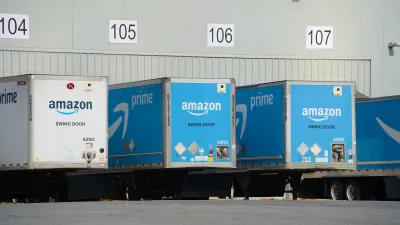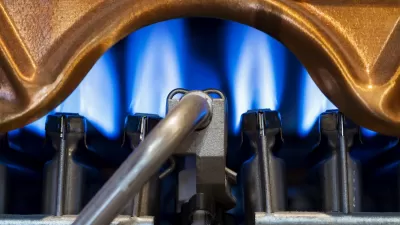Responding to the New York train crash that killed six this month, Sam Tanenhaus reflects on how commuting got so dangerous and why we don't demand better.
The February 3 collision between a Metro-North commuter train and an SUV in suburban New York was the deadliest incident in that rail line's history. An article by Sam Tanenhaus for The New Yorker links that morbid scene with the daily brushes with death that have always come with a hard commute.
There is a sense of disillusionment with the mid-century infrastructural ambitions of Robert Moses, whose aged creations still make up the backbone of suburban New York City. City problems have come to the country, and safety is a concern: "Today those roads—the actual ones—are still charming. But they are also treacherous: the twisty access lanes, the narrow shoulders, the cryptic and poorly placed signage."
Tanenhaus speculates on America’s fixation with the open road and getting out into the country. That story begins with trains, which predate the auto era in a long history of risky transit. He characterizes dangerous commutes as a public health problem, one we accept as inevitable without questioning that might be.
FULL STORY: The Failed Dream of the Easy Commute

Planetizen Federal Action Tracker
A weekly monitor of how Trump’s orders and actions are impacting planners and planning in America.

Chicago’s Ghost Rails
Just beneath the surface of the modern city lie the remnants of its expansive early 20th-century streetcar system.

San Antonio and Austin are Fusing Into one Massive Megaregion
The region spanning the two central Texas cities is growing fast, posing challenges for local infrastructure and water supplies.

Since Zion's Shuttles Went Electric “The Smog is Gone”
Visitors to Zion National Park can enjoy the canyon via the nation’s first fully electric park shuttle system.

Trump Distributing DOT Safety Funds at 1/10 Rate of Biden
Funds for Safe Streets and other transportation safety and equity programs are being held up by administrative reviews and conflicts with the Trump administration’s priorities.

German Cities Subsidize Taxis for Women Amid Wave of Violence
Free or low-cost taxi rides can help women navigate cities more safely, but critics say the programs don't address the root causes of violence against women.
Urban Design for Planners 1: Software Tools
This six-course series explores essential urban design concepts using open source software and equips planners with the tools they need to participate fully in the urban design process.
Planning for Universal Design
Learn the tools for implementing Universal Design in planning regulations.
planning NEXT
Appalachian Highlands Housing Partners
Mpact (founded as Rail~Volution)
City of Camden Redevelopment Agency
City of Astoria
City of Portland
City of Laramie





























